|
|
|
Sort Order |
|
|
|
Items / Page
|
|
|
|
|
|
|
| Srl | Item |
| 1 |
ID:
105182
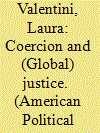

|
|
|
|
|
| Publication |
2011.
|
| Summary/Abstract |
In this article, I develop a new account of the liberal view that principles of justice (in general) are meant to justify state coercion, and consider its implications for the question of global socioeconomic justice (in particular). Although contemporary proponents of this view deny that principles of socioeconomic justice apply globally, on my newly developed account this conclusion is mistaken. I distinguish between two types of coercion, systemic and interactional, and argue that a plausible theory of global justice should contain principles justifying both. The justification of interactional coercion requires principles regulating interstate interference; that of systemic coercion requires principles of global socioeconomic justice. I argue that the proposed view not only helps us make progress in the debate on global justice, but also offers an independently compelling and systematic account of the function and conditions of applicability of justice.
|
|
|
|
|
|
|
|
|
|
|
|
|
|
|
|
| 2 |
ID:
090349
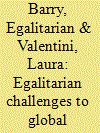

|
|
|
|
|
| Publication |
2009.
|
| Summary/Abstract |
Many political theorists defend the view that egalitarian justice should extend from the domestic to the global arena. Despite its intuitive appeal, this 'global egalitarianism' has come under attack from different quarters. In this article, we focus on one particular set of challenges to this view: those advanced by domestic egalitarians. We consider seven types of challenges, each pointing to a specific disanalogy between domestic and global arenas which is said to justify the restriction of egalitarian justice to the former, and argue that none of them - both individually and jointly - offers a conclusive refutation of global egalitarianism.
|
|
|
|
|
|
|
|
|
|
|
|
|
|
|
|
| 3 |
ID:
115198
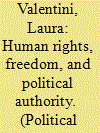

|
|
|
|
|
| Publication |
2012.
|
| Summary/Abstract |
In this article, I sketch a Kant-inspired liberal account of human rights: the freedom-centred view. This account conceptualizes human rights as entitlements that any political authority-any state in the first instance-must secure to qualify as a guarantor of its subjects' innate right to freedom. On this picture, when a state (or state-like institution) protects human rights, it reasonably qualifies as a moral agent to be treated with respect. By contrast, when a state (or state-like institution) fails to protect human rights, it loses its moral status and becomes liable to both internal and external interference. I argue that this account not only steers a middle course between so-called natural-law and political approaches to human rights but also satisfies three important theoretical desiderata-explanatory power, functional specificity, and critical capacity.
|
|
|
|
|
|
|
|
|
|
|
|
|
|
|
|
| 4 |
ID:
136696
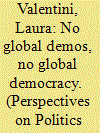

|
|
|
|
|
| Summary/Abstract |
A globalized world, some argue, needs a global democracy. But there is considerable disagreement about whether global democracy is an ideal worth pursuing. One of the main grounds for scepticism is captured by the slogan: “No global demos, no global democracy.” The fact that a key precondition of democracy—a demos—is absent at the global level, some argue, speaks against the pursuit of global democracy. I discuss four interpretations of the skeptical slogan—each based on a specific account of the notion of “the demos”—and conclude that none of them establishes that the global democratic ideal must be abandoned. In so doing, I systematize different types of objections against global democracy, thus bringing some clarity to an otherwise intricate debate, and offer a robust but qualified defense of the global democratic
|
|
|
|
|
|
|
|
|
|
|
|
|
|
|
|
| 5 |
ID:
143143
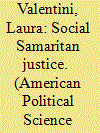

|
|
|
|
|
| Summary/Abstract |
In late 2012, Hurricane Sandy hit the East Coast of the U.S., causing much suffering and devastation. Those who could have easily helped Sandy's victims had a duty to do so. But was this a rightfully enforceable duty of justice, or a nonenforceable duty of beneficence? The answer to this question is often thought to depend on the kind of help offered: the provision of immediate bodily services is not enforceable; the transfer of material resources is. I argue that this double standard is unjustified, and defend a version of what I call “social samaritanism.” On this view, within political communities, the duty to help the needy—whether via bodily services or resource transfers—is always an enforceable demand of justice, except when the needy are reckless; across independent political communities, it is always a matter of beneficence. I defend this alternative double standard, and consider its implications for the case of Sandy.
|
|
|
|
|
|
|
|
|
|
|
|
|
|
|
|
|
|
|
|
|